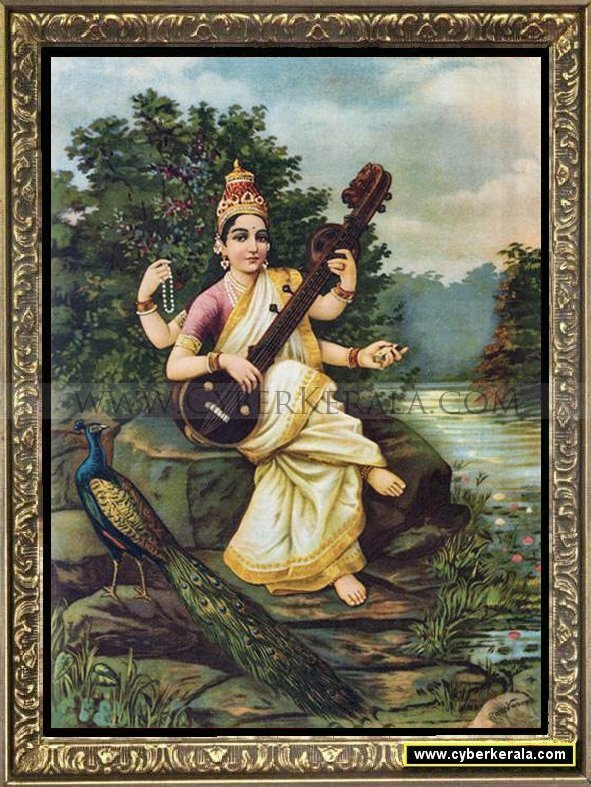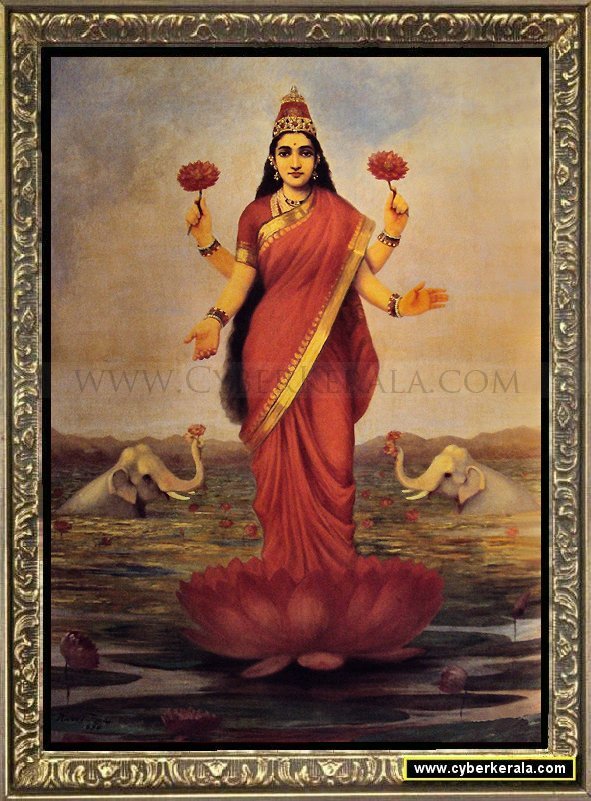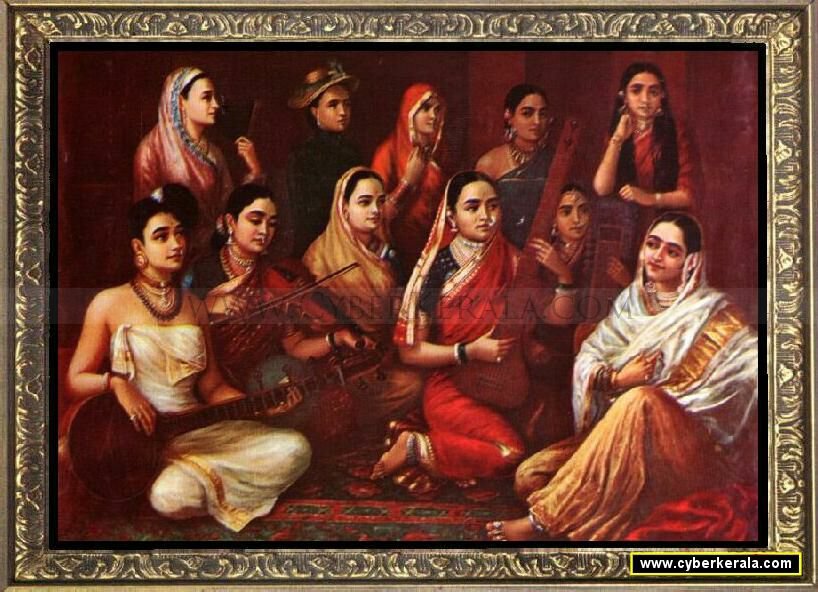I am a huge fan of his depiction of women and his overall passion for Art. He was the first artist to have created the notion of an Indian beauty that wasn't specific to any one part of India. The depiction of figure and face that is the traditional image of the Indian woman we see today is a Ravi Varma trademark. Being a well traveled and a well read artist, he was able to fuse Indian and Western techniques to come up with his unique kitsch style.
Image source:www.cyberkerala.com
He was recognized as a child prodigy and was endowed the title "Raja" by his uncle, The King of Travancore - Raja Ayilyam Thirunal. Raja Ayilyam Thirunal saw ravi varma's charcoal drawings on palace walls and recognized the talent in his nephew. His formal art lessons started when he was 6, he was later trained to use water colours by Rama Swamy Naidu, Travancore's Palace-artist. Three years later, British Painter Theodor Jenson took him under his wings to train him in oil painting. Varma won the first prize in Madras Art Exhibition in 1873 and then another prize in Vienna in 1876. This brought him an international recognition.His paintings and techniques were said to be highly influenced by western art and artists of his times. Despite all the criticism his work received (when he was alive), it is amazing to see that his versions and interpretations of the Hindu mythology are popular even in the 21st century. Every consecutive representation of Hinduism in print, movies and the theater are all inspired by Ravi Varma's paintings.

Image Source: cyberkerala.com

It was during the late nineteenth century that the modern Indian Hindu iconography was finding its place beyond sculptures and murals in Hindu temples. It is interesting to note that traditional hindu pooja rooms (at home) had small brass/silver or gold idols at the altar. Unlike all the picture frames which are a common thing as of today.
Raja Ravi Varma is said to have pioneered the picture printing press by setting up India's first ever Lithographic press in Mumbai. He was foremost among artists to print hundreds of copies of his famous paintings. He brought religious icons and murals to the masses, there by bringing in the concept of Industrialized art to India. However, it is rather sad that only a portion of his work has been printed till date.
He was also known to have been criticized for commercializing production of pictures of gods and other mythological subjects. While researching for critical interpretations of his work, I came across this movie trailer - Rang Rasiya. This movie is said to be a biographical sketch of this famous artist. It is a nice depiction of this Artist Prince....As some one aptly said -He is a Prince among Artists and the Artist among princes.
Although, I had started out writing this article about him, I found this video (in hindi) and had to share it here. As they say pictures speak louder than words, I felt that this video would be able to showcase the artist better than what I could write.
Source: youtube
It is interesting to see that he used his art as the most influential medium of visual communication in a socially and culturally fragmented Indian society. It must have been a strong force in motivating people during political canvassing in British India. Apart from the political and social influence, his paintings had an impact other art and dance forms of Kerala. For example, in 1960's, Mohini aattam guru Satyabhama made some changes to the attire and hairstyle of mohini aattam dancers. This was to give this dance form a distinction from other South Indian dance forms - Bharathanatyam or Kuchipudi.
Here is a wonderful collection of his Oleographs:


Hi! sudha. keep it up. marvellous collection of treasure. regards. alok
ReplyDeleteHi alok
ReplyDeletethank you for stopping by and the comment..:)
I am glad you liked them....I am sure whatever we write is less for an artist of his stature
Keep visiting and letting me know what you think
take care
Just superb... We .. I mean.. I .. can only dream to do half the painting.. His work is above amazing.. Lovely post.. Well done Sudha!
ReplyDeletethank u Particia... I too have been wanting to buy atleast one of the original vintage oleographs. My grandmother has the saraswathi print and I have been eyeing it for a long time now :)
ReplyDeleteAwesome .. i am yet to read other posts..
ReplyDeleteAll i can say is your detailing and the ability to present things so well does not surprise me.. As i always say.. I always beleived you cld..
Keep writing.. :)
Hey
ReplyDeletenice to see u in circulation after a long time...i m glad you liked the post :)
Hi Sudha,
ReplyDeleteThat is an absolutely fantastic post. Loved it because it opened a new world to me. Never knew the the pictures of god's goddesses that I grew up with had such an interesting back ground.
Thanks raj. I have been waiting to see this movie on the artist...not sure if the DVDz are out ...it was released in 2008 end i guess... :).
ReplyDeleteI am a big fan of his paintings too. I stopped by to wish you a Happy New Year. Good luck!
ReplyDeleteHey
ReplyDeletethanks a lot and a happy new year to you too :)
hi sudha,
ReplyDeletewas very busy with schedules at home.just put up my feet after putting two blog posts for the year.i missed your posts.such detailed posts about ravi varma.i have also written not about ravi varma but about the gods and godesses
prints in my decor blog.hope u have read it
nicely written.good work.
yes lakshmi, I did read through every post in your blog...as i mentioned in my post...every decor blogger has written about this great painter and presented this artist's work beautifully. I tried contributing my two cents :)
ReplyDeleteNice post. I love his paintings, but it is this post of yours that made me realise his contribution to the printing industry in India. Thanks for sharing.
ReplyDeleteThanks pa...quite true I read about his contributions to the Art Mass commercialization in a book on Indian Art...So wrote it here...:)
ReplyDeleteSudha,
ReplyDeletea great article.
would you know by any chance where can one buy some of these original oleographs and an indicative price!
hey ajit
ReplyDeletethere are quite a few online stores that sell nice prints (oleographs) of these paintings. Will let you know soon.
thank u for the visit..do keep stopping by and take care :)
KEEP
ReplyDeleteIT
UP
SUDHA MANNI
LOVE
SHRUTI SRI.R
Lovely article. I am also a huge fan of Ravi Verma's painting, growing up seeing his paintings in print form like calenders etc. Every house would have printed version of his painting. I was just browsing the internet about his prints when i saw your blog. I have 3 prints of his paintings, one is Saraswathi, and the other two are of a single woman standing, and the other one is is baby boy looks like Krishna and Yashoda. i picked up these two painting because of their beautiful earrings, which looks a lot like mine, and the Saraswathi picture I always wanted to have.
ReplyDeleteGreat job.
Please could you do away with the word verification, it is really irritating. Don't worry we don't get spams these days.